15 Healthiest Breakfast Foods for Weight Loss
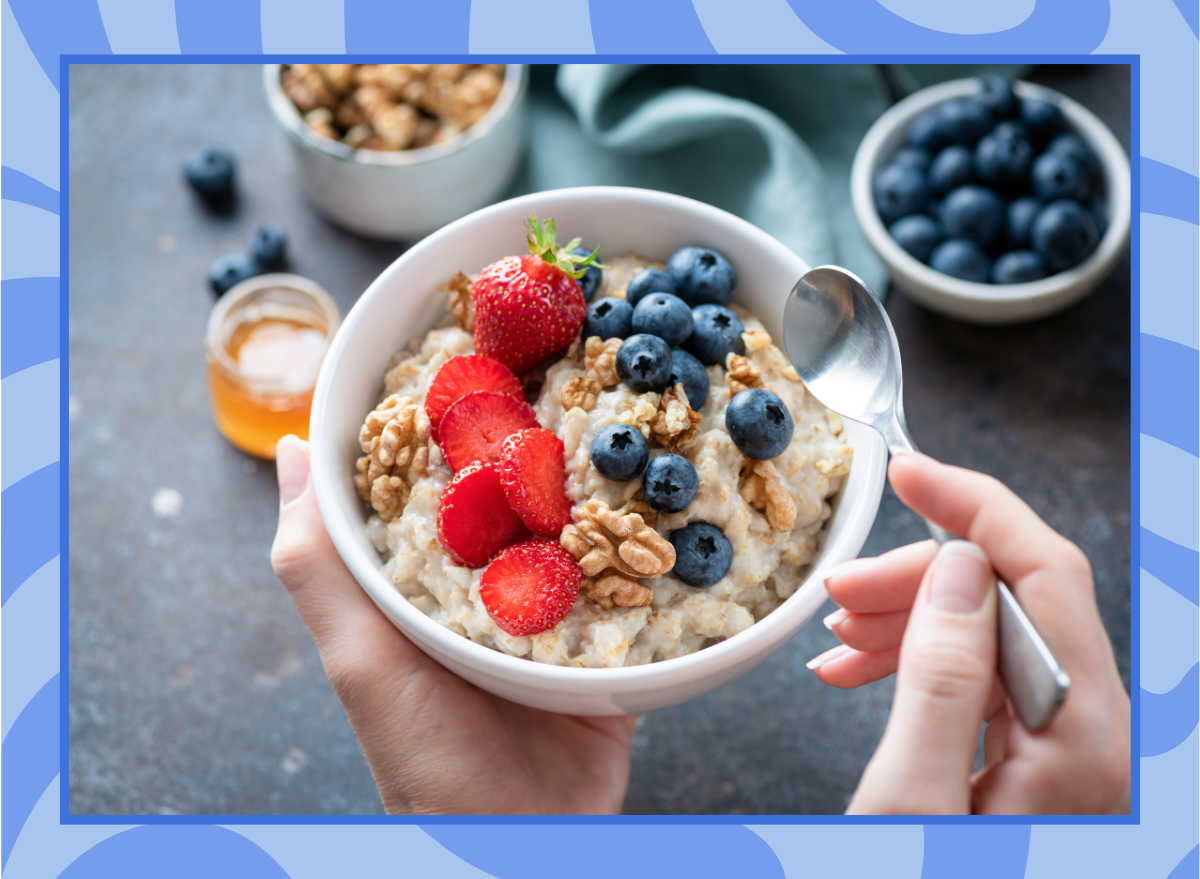
Fueling your morning with the right breakfast foods can jumpstart your metabolism, keep you full longer, and support your weight loss goals. A well-balanced breakfast not only energizes your day but also lays the foundation for sustainable weight management, whether you're hitting the gym or heading to the office.
But with so many healthy breakfast options available, knowing which foods truly help with weight loss can feel overwhelming. To simplify things, we consulted dietitians to uncover the healthiest breakfast foods for weight loss. From high-protein staples to fiber-packed options, these expert-backed picks will help you start your day on the right foot.
Read on to discover the 15 healthiest breakfast foods for weight loss, and for even more meal inspiration, check out 30 Healthy Breakfast Ideas To Fuel Your Morning.
In This Article
- 15 Best Breakfast Foods for Weight Loss
- 11 Healthy Breakfast Ideas
- Tips to Leverage Breakfast for Effective Weight Loss
- Common Breakfast Mistakes to Avoid
15 Best Breakfast Foods for Weight Loss
Yogurt
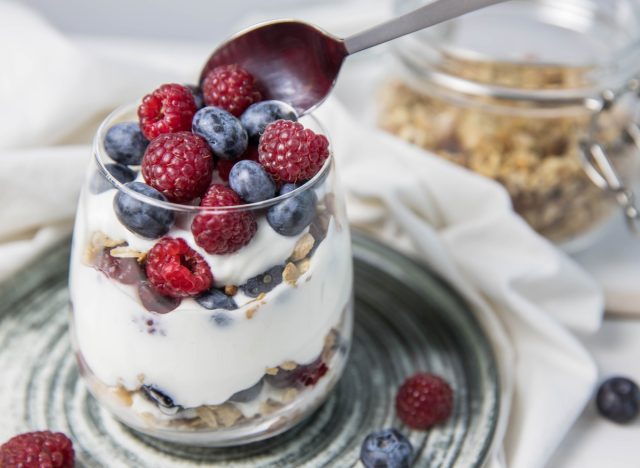
Whether you opt for Greek yogurt, Icelandic skyr, or prefer the traditional route, yogurt is undeniably one of the most versatile healthy dairy options you can incorporate into your weight loss breakfast routine.
"Numerous studies show that yogurt can be part of a healthy weight loss plan," says Toby Amidor, MS, RD, CDN, FAND, award-winning nutrition expert and Wall Street Journal bestselling author of The Family Immunity Cookbook, noting that "a 2015 published systematic review found that yogurt consumption was associated with lower body mass index, lower body weight/weight gain, smaller waist circumference and lower body fat in epidemiological studies. Randomized control trials suggest that there are weight reduction effects, but do not permit determination of a cause-effect relationship."
"I use yogurt to make breakfast smoothies, parfaits, and to top my pancakes and waffles. I even make homemade berry compote to top my morning yogurt," says Amidor.
Smoothies
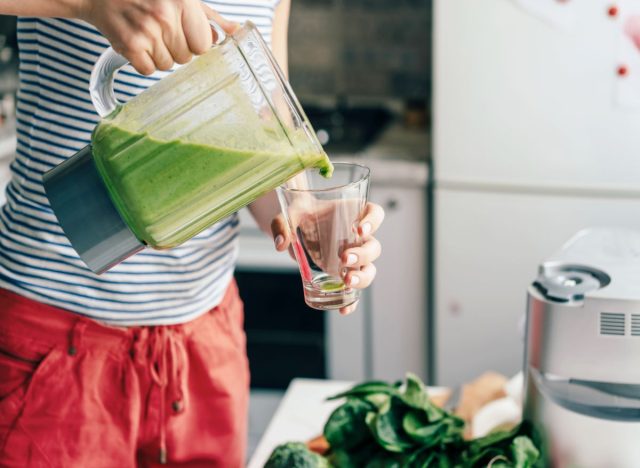
For a fast and easy breakfast capable of combining all the essential nutrients able to promote weight loss, blending up a smoothie can be a great solution. To strike a healthy balance conducive to weight loss, think about ingredients that can help you knock out a daily serving of fruits and veggies while also including some carbs, healthy fats, and even a little protein when combining ingredients like berries, leafy greens, nuts, yogurt, hemp, flaxseed, oats, and even dark chocolate.
Protein Shakes
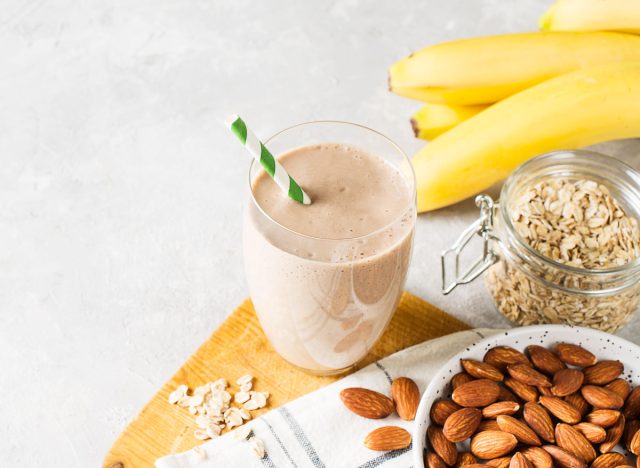
If consuming more high-protein foods is integral to your overall weight loss plan, whipping up a protein shake is another quick and easy healthy breakfast solution that can provide you with energy while also keeping you fuller for longer.
"A [June 2022] study [published in The Journal of Nutrition] found that weight loss correlated to an intake of a high-protein plus high-fiber shake," notes Caroline Thomason, RD, LDN, CDCES.
Eggs

Eggs are protein-packed breakfast staples that are as versatile as they are delicious. Best of all, these nutrient-dense delights can also be incorporated into healthy diets designed to promote weight loss. According to Thomason, research shows that "breakfasts that include eggs [have been] found to induce weight loss in the context of a low-calorie diet plan."
Veggie Omelet

"An egg omelet rich in veggies is a great way to start your day that is both high in fiber and protein!" says Jamie Adams, MS, RD, a women's health expert at Well Nourished Mamas. "Eggs are an excellent source of protein. High-protein diets have been associated with increased fullness, reduced appetite, and increased metabolism, three factors that can all help lead to overall weight loss."
Black Beans
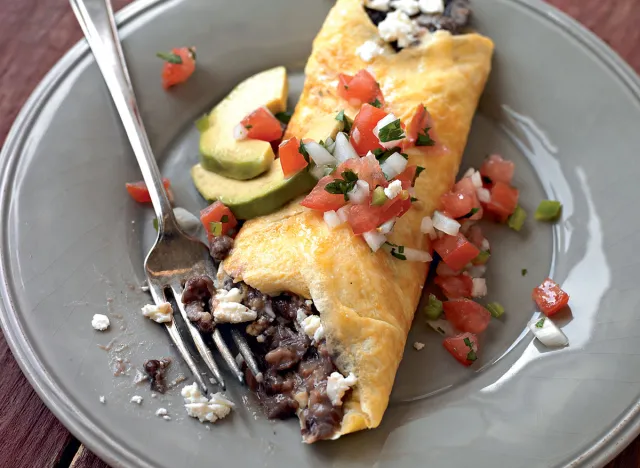
Whether you're folding them into an omelet or serving them alongside your huevos rancheros, black beans are a fiber-dense legume that can help manage a healthy appetite by keeping any hanger-motivated unhealthy eating impulses at bay that could throw off your weight loss plans. In addition to containing about 15 grams of fiber per cup, one cup of black beans also includes over 15 grams of protein and is rich in important vitamins your body needs like calcium, iron, and magnesium.
Peanut Butter
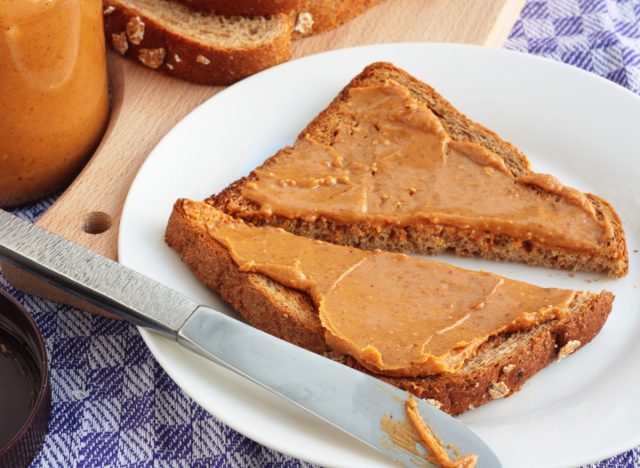
"[Peanut butter is a] breakfast favorite that also provides a combination of healthy fat, protein, and fiber, which all take longer to digest and promote satiety," says Amidor. "Two tablespoons of peanut butter provide about 190 calories, 16 grams of fat (mainly unsaturated), 7 grams of protein and 2 grams of fiber."
"Spread peanut butter on whole grain toast, stir a spoonful into oatmeal," she suggests, "or add to your morning smoothie like in this Banana Peanut Butter Smoothie."
Whole Grain Toast
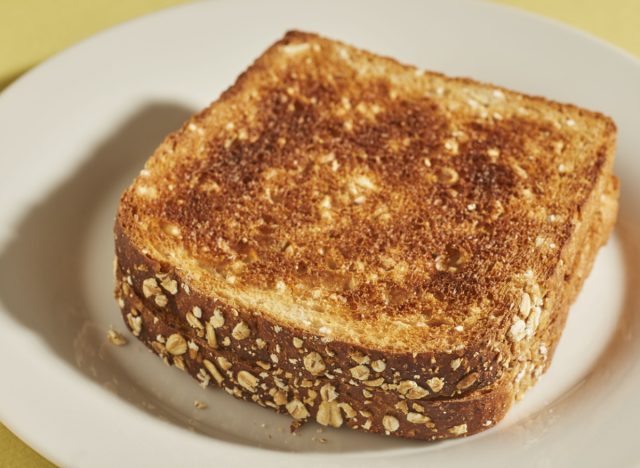
"A study published in Advances in Nutrition found that consuming breakfast foods high in whole grains is a promising strategy for metabolic health promotion," explains Amidor. "This also includes helping with weight loss."
Your whole-grain toast can cover the carb and fiber components of your breakfast, while also serving as a great blank canvas for other healthy foods that can help you achieve a quality nutritional balance that can help you lose weight. If you're at a loss on how to best top your toast for a tasty treat able to beat that bulge, try any of our creative Toast Recipe Ideas.
Oatmeal
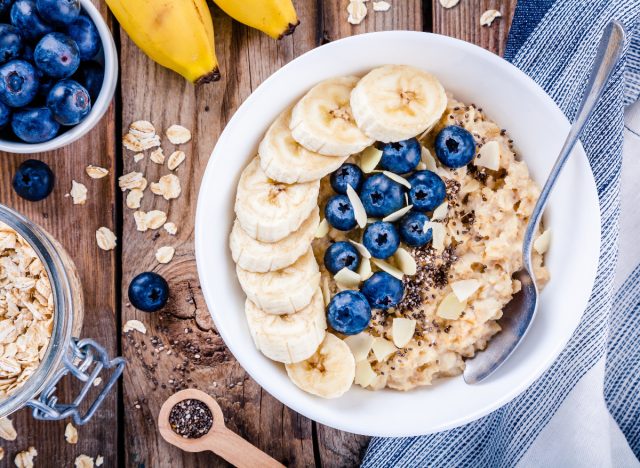
"Oatmeal topped with nut butter and berries provides a high-fiber breakfast to start your day while keeping you full and satisfied," explains Adams. "A review on the health benefits of oats highlights the importance of beta-glucan found in oats in managing blood sugar levels and the release of peptide YY, a hormone that helps increase satiety, both of which help to reduce overall food intake, body weight, and body fat."
Overnight Oats
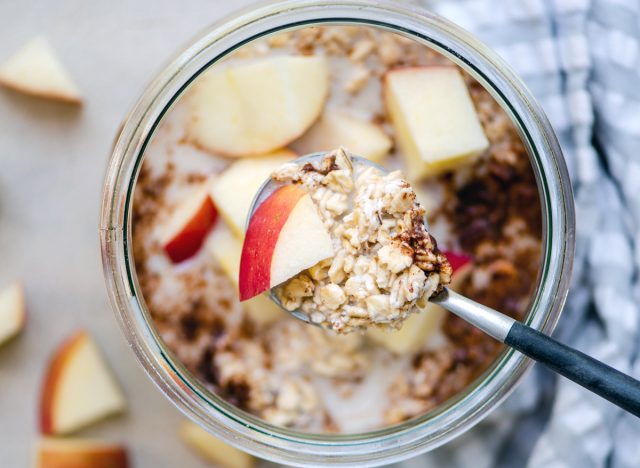
Another filling, oat-based breakfast favorite that encourages weight loss is one you can easily prep in advance for those busy mornings where just need to get going ASAP: overnight oats. After combing your choice ingredients, pop them in the fridge to soak, and either eat as-is the next day or you can heat them in the microwave for a few seconds to get your day on a healthy roll.
"A warm bowl of […] overnight oats at breakfast is another option that can be part of a healthy weight loss plan," says Amidor. "A study in Nutrition Reviews concluded that evidence suggests that a component called beta-glucans in oats helps with satiety—which is one method to help with weight loss," she adds. "When you're feeling satisfied, you tend to stay fuller longer."
Cottage Cheese
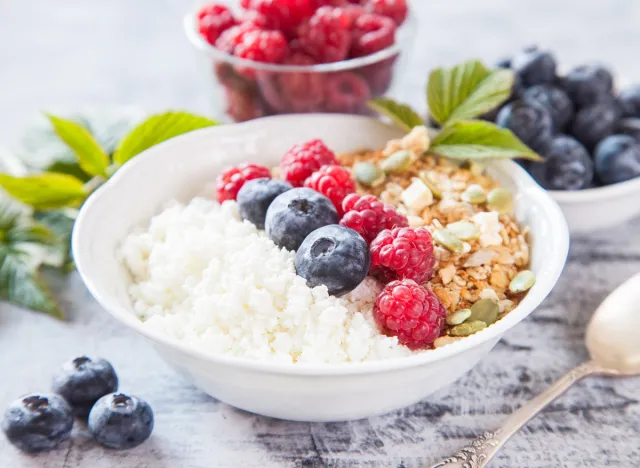
"Cottage cheese with mixed berries and crushed nuts also makes for a high-fiber, high-protein breakfast," says Adams. "One review article found that aiming for 25-30 grams of protein per meal is ideal for appetite control and weight loss. With 25-28 grams of protein per cup, cottage cheese makes for a great start to your day!"
Salmon
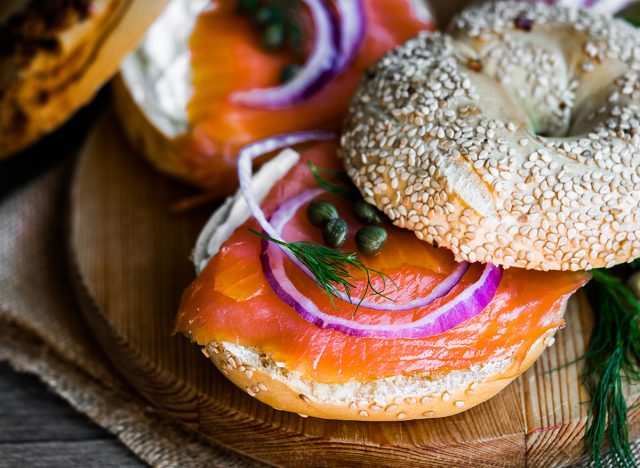
If you're tired of traditional lean breakfast proteins like eggs or turkey bacon, why not spice things up by venturing under the sea instead? Just 2 ounces of smoked salmon contains a whopping 13 grams of protein, enabling this fish's ability to positively affect one's energy, metabolism, and appetite. Plus, salmon is rich in omega-3 fatty acids, which research has shown can help suppress hunger and control appetites in ways that can lead to healthy weight loss. For a more weight loss-friendly take on a classic NYC breakfast favorite, pair your smoked salmon with whole grain toast or scooped-out pumpernickel bagel; a dollop of whipped cream cheese or Greek yogurt; a little red onion, some capers, and couple cups of mixed greens.
Prunes
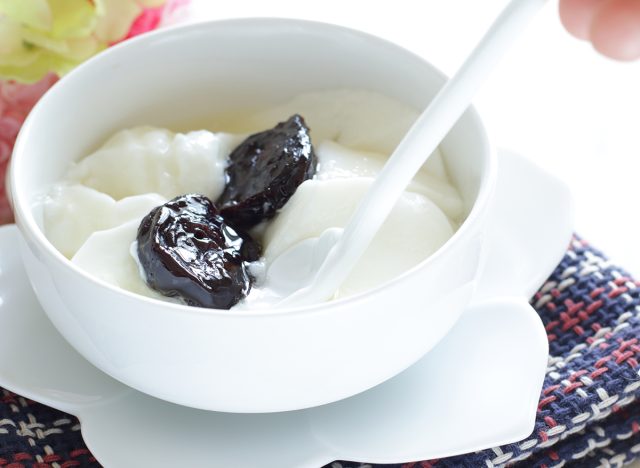
"The satiating power of nutrient-dense prunes can calm your appetite, which may help with weight management," says Amidor. "It is prunes' fiber content that is suspected to be part of the magic satiety sauce, and research also backs this up."
In a 2021 study, researchers found that participants who snacked on prunes consumed fewer calories overall compared to those who ate raisins or jellybean-like candy. "The prune snackers also reported reduced hunger levels, improved satiety, and a greater perceived ability to consume less food at a later eating occasion," Amidor explains.
Another phase of the study revealed that participants who incorporated prunes into a 12-week weight loss program experienced slightly greater weight loss than those who followed healthy snacking guidelines without prunes. While the weight loss differences weren't statistically significant, Amidor notes that "those who consumed prunes also reported higher levels of satisfaction and greater ease of following the weight loss program."
To boost satiety at breakfast, Amidor suggests adding prunes to oatmeal or folding chopped prunes into muffin batter. "They keep me satisfied until my next meal," she says.
Protein Pancakes
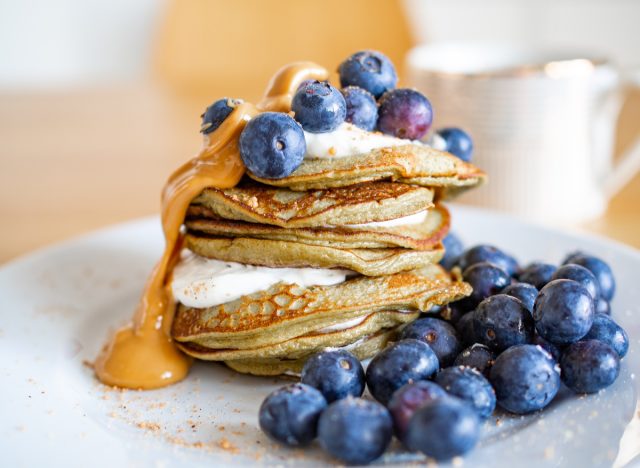
"Protein pancakes are an excellent breakfast because it feels like your traditional comfort food but still gives you a high-protein meal," says Molly Snyder, RDN, owner of Full-Filled Nutrition, LLC.
Up the ante on the protein in your pancake recipe with ingredients like protein powder, cottage cheese, or even Greek yogurt. If you're still hesitant about how your protein-packed pancakes might measure up against a classic stack, try our recipe.
Avocado
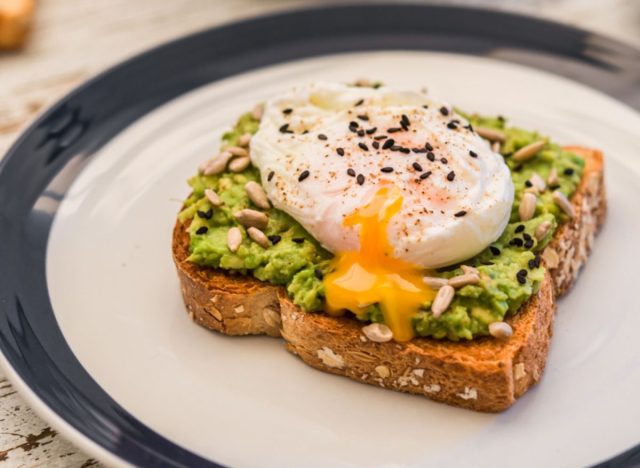
Rich in fiber and healthy unsaturated fats (including omega-3 fatty acids), avocados are a filling, versatile stone fruit able to complement any healthy breakfast. In fact, the results of one study published by the Journal of Nutrition indicated that eating about one avocado per day can be especially helpful for women who are hoping to reduce visceral fat, which is considered the most detrimental type of fat to your overall health. Avocados are also a great way to help manage your cholesterol, supports your heart health, and even improve cognition.
11 Healthy Breakfast Ideas
As Snyder notes above, a healthy breakfast can and should include a variety of foods each day, especially if weight loss is your endgame. But if you're not quite sure how to best combine your assortment of groceries into a quality breakfast or are at a loss of how to come up with meal concepts that can encourage losing weight, here are a few healthy breakfast ideas for weight loss to help get you started.
- Greek or Icelandic yogurt with berries and granola (Want to get a little fun and fancy? Layer these ingredients for a parfait!)
- Oatmeal with apples, peanut butter, flaxseeds, and a sprinkling of cinnamon
- Southwest-inspired eggs, black beans, avocado, and tomato salsa
- Smoked salmon, toast using high-fiber bread, Greek yogurt spread, tomatoes, red onion, cucumber, and capers
- Ground turkey and egg hash with sweet potatoes
- A smoothie with peanut butter, strawberries, banana, fresh spinach, and protein powder
- Whole grain toast with cashew butter and bananas
- A quiche with spinach and ham
- Whole wheat pancakes with berries, walnuts, and yogurt
- Chia pudding with fresh fruit
- An iced coffee protein shake
With these recipe concepts in tow, your next shopping trip to the grocery store should be easy breezy.
Tips to Leverage Breakfast for Effective Weight Loss
Before diving into which healthy breakfast foods can help fuel weight loss, it's important to understand how to best use your morning meal to your advantage while also having a solid strategy that best supports your weight loss journey. Here are a few strategic tips to help:
- Plan & prep in advance: "Proper meal planning for breakfast can ensure that healthier options are eaten. That way you know what you want to eat and can make sure you have all your ingredients when you go food shopping," explains Amidor. "Also, meal prepping breakfast options can help you be prepared in advance and have an easy, healthier breakfast you can grab and go."
- Go for high-protein picks: "Choose a breakfast option with [over] 20 grams of protein," Thomason tells Eat This, Not That! "This means choosing eggs, Greek yogurt, or a protein-packed smoothie to hit these numbers."
- Pair carbs with digestion-slowing protein and fat: "Pairing a high-fiber carbohydrate with a protein and fat will help fuel your body while keeping you full and satisfied throughout the day. This combination of carbs, protein, and fat reduces blood sugar spikes and crashes, leading to [fewer] cravings and snacking throughout the day," says Adams.
- Allow for variety: "To ensure your weight loss is successful, plan different options. Have some quick options that you can back up your plan with. This may be overnight oats that you didn't add any liquid to or egg muffins in the freezer," says Snyder.
Common Breakfast Mistakes to Avoid
In addition to knowing what to eat for breakfast in order to help you lose weight, you'll also want to be mindful of common breakfast-related habits that, though tempting, may present obstacles to your weight loss goals. In order to help you stay on track and get the best out of every breakfast, here's what the experts say you should avoid:
- Overeating and/or eating empty calories that don't keep you full: "Oftentimes folks either overeat at breakfast, taking in more calories they need," says Amidor. "The other issue commonly found is choosing foods that don't keep you satisfied—like a slice of white bread with jelly or a doughnut. These foods are low in fiber, and don't provide healthy fats and/or protein, all which help keep you feeling full and satisfied."
- Limiting what you eat to 'save calories' for later: "Often I see people skimping on breakfast to try and 'save calories' for later in the day," says Thomason. "However, this backfires often because skipping breakfasts means that we get hungrier and cravings may become more intense as the day goes on. Research shows that consuming a high-protein breakfast might help blunt hunger later."
- Skipping or substituting breakfast: "One of the most common eating mistakes I see my clients make at breakfast time when trying to lose weight is skipping breakfast altogether," says Adams. "If they're not skipping breakfast altogether, another common mistake I see is eating low-calorie bars, shakes, or meal replacements that are often low in micronutrients and fiber. The mindset of feeling the need to restrict calories and total intake to lose weight is one of the most common things I hear from my clients. However, significant calorie restrictions can lead to altered metabolism, blood sugar instability, and hormone imbalance, resulting in increased cravings, snacking, and overall weight gain."
- Source: https://www.ncbi.nlm.nih.gov/pmc/articles/PMC8568444/
- Source: https://www.sciencedirect.com/science/article/pii/S1550413122003448?via=ihub
- Source: https://www.nature.com/articles/ijo2015202
- Source: https://www.sciencedirect.com/science/article/abs/pii/S002231662200637X?via%3Dihub
- Source: https://fdc.nal.usda.gov/fdc-app.html#/food-details/171287/nutrients
- Source: https://www.ncbi.nlm.nih.gov/pmc/articles/PMC2755181/
- Source: https://www.ncbi.nlm.nih.gov/pmc/articles/PMC7539343/
- Source: https://fdc.nal.usda.gov/fdc-app.html#/food-details/173735/nutrients
- Source: https://www.mdpi.com/2304-8158/10/11/2591/htm
- Source: https://academic.oup.com/nutritionreviews/article/74/2/131/1924832
- Source: https://academic.oup.com/ajcn/article/101/6/1320S/4564492?fbclid=IwAR2oj237alj2mSwVfXbY6Gk0lu4uiHbaByaDCz6WxnEcFrnioi3rqmJx9cQ&login=false
- Source: https://fdc.nal.usda.gov/fdc-app.html#/food-details/358585/nutrients
- Source: https://pubmed.ncbi.nlm.nih.gov/18602429/
- Source: https://www.ncbi.nlm.nih.gov/pmc/articles/PMC7190064/?fbclid=IwAR1qAQoiGenPGSXBEU8HL7eHPwy-gR5EQ-DAwQP5jBwJ0gh69os5VDQDqBE
- Source: https://www.ncbi.nlm.nih.gov/pmc/articles/PMC8417923/
- Source: https://www.ncbi.nlm.nih.gov/pmc/articles/PMC3105953/
- Source: https://onlinelibrary.wiley.com/doi/10.1002/oby.23578









